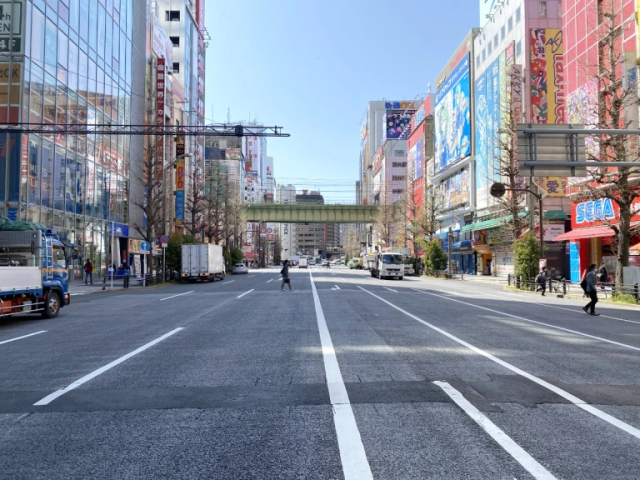
The gathering point for anime and game fans from around the globe looks eerily different these days.
Akihabara isn’t the most crowded neighborhood in Tokyo, but it’s less likely to be empty than just about anywhere else in the city. That’s because many other districts’ crowds are tied to specific times or days of the week, while Akihabara is a constant draw for one demographic or another.
As Japan’s center for anime and video game culture, on the weekends it’s filled with domestic otaku on day-long shopping runs and event attendance itineraries. But it’s also a major attraction for overseas tourists who are in Japan on vacation, for whom it’s just as easy to come on a weekday as the weekend, and there are plenty of offices mixed in among the specialty shops with workers who clock in every morning and are there all day, possibly grabbing dinner in a local restaurant after their shift.
These days, though, Akihabara is a much lonelier place.
Our reporter P.K. Sanjun visited the neighborhood to see how it’s coping in the coronavirus era, and sure enough, the streets were startlingly empty. That picture above is taken right outside JR Akihabara Station’s Electric Town Gate, which funnels people towards the densest collection of anime and electronic shops. Usually, the walkway is packed with groups of friends debating where to search first on whatever treasure hunt has brought them to Akihabara, plus smiling tourists snapping selfies as they finally set foot on otaku holy ground, but that’s definitely not the case now.
It was a similar situation as P.K. moved deeper into the backstreets. No cosplayers posing. No cheerful maids calling him “Master!” or “Big Brother!” as they invited him into their cafes. Just quiet streets, and the energetic atmosphere the entertainment-oriented area usually buzzes with replaced with the occasional solitary bird chirp.
The neighborhood isn’t entirely deserted, though. While Akihabara is most famous for its retail shops, it’s also got a lot of offices, particularly in the UDX skyscraper that’s become a symbol of the neighborhood, and some of their employees are still commuting in. From their unusually quick footsteps and lack of chatter, though, P.K. got the sense that most are in the mindset of “Get in to the office, get work done as quickly as possible, and get home.” Several lunchtime hot spots had no lines at all, suggesting that even among those who are still coming to work, many are opting to eat in their offices rather than make another trip outside.
Before leaving, P.K. spoke with a clerk at one of Akihabara’s major electronics stores, asking how things have been since the start of the coronavirus situation, to which the worker replied:
“Some of it might have been because it snowed, but last weekend it was startling how few customers we had. It’s really unusual to see Akihabara so empty, isn’t it? There’s been a sharp drop in the number of weekday shoppers. Unless they need to buy appliances or something urgently, I think everyone is ordering their stuff online right now.
I think the number of businesspeople in the area has dropped too. The area around the station is still really crowded during the morning and evening rush hours, though. And the overseas tourists have almost totally disappeared. Every now and then you’ll spot a solo traveler, but there really aren’t any multi-person parties or tour groups coming through Akihabara.”
As with Tokyo’s Asakusa neighborhood, many Akihabara restaurants and businesses are dependent on tourists, both from elsewhere in Japan and other parts of the world. Obviously with the health situation being what it is, you can’t fault people for staying home, but this is definitely putting a strain on one of the most unique places in Japan, and hopefully the crowds will be back as soon as it’s safe.
Photos ©SoraNews24
● Want to hear about SoraNews24’s latest articles as soon as they’re published? Follow us on Facebook and Twitter!
[ Read in Japanese ]
Follow Casey on Twitter, where if and when you go to Akihabara, he strongly recommends the Kurikoan taiyaki stand for a snack.

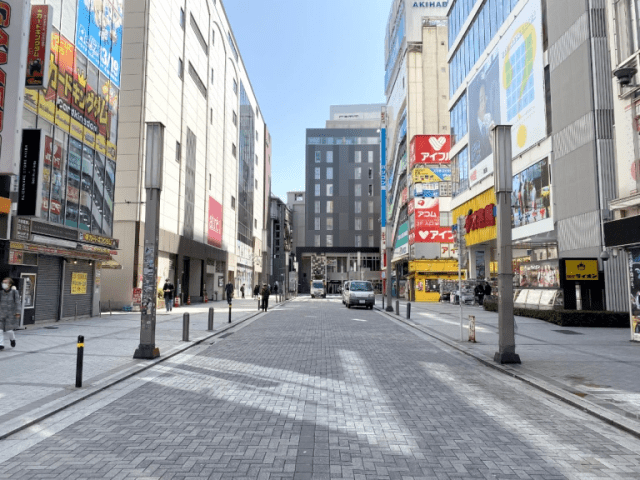
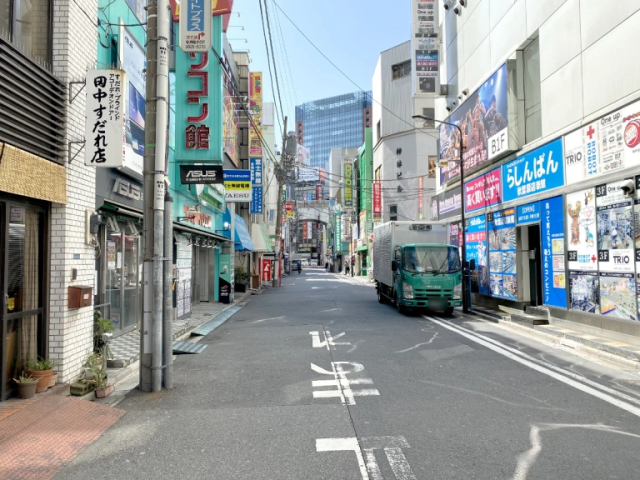
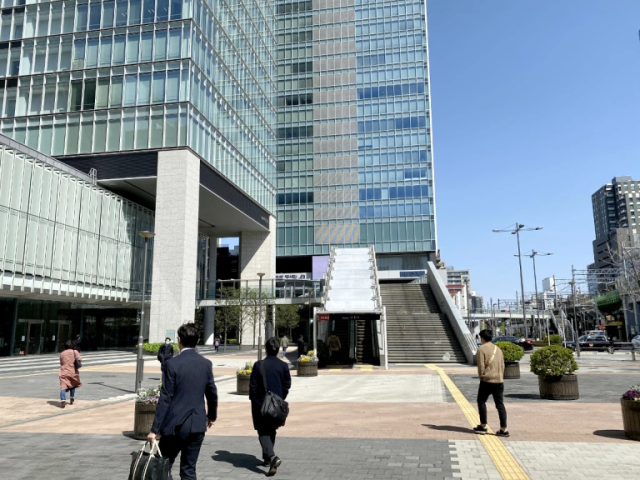
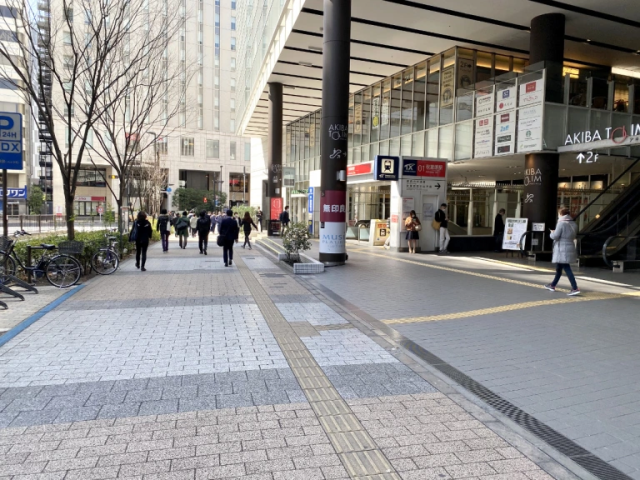
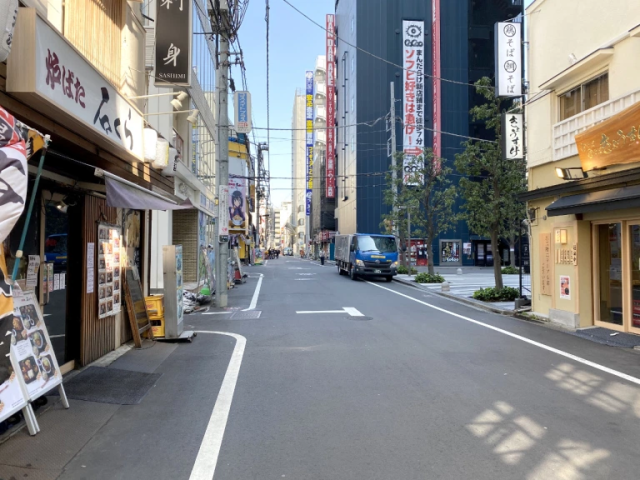
 Tokyo rickshaw puller tells us why he isn’t staying home from work during coronavirus outbreak
Tokyo rickshaw puller tells us why he isn’t staying home from work during coronavirus outbreak Tokyo’s Akihabara looks otherworldly beautiful when all the people are gone【Photos】
Tokyo’s Akihabara looks otherworldly beautiful when all the people are gone【Photos】 This one photo shows how tough times are in Tokyo’s Akihabara these days
This one photo shows how tough times are in Tokyo’s Akihabara these days Game over as 33-year-old landmark arcade closes in Tokyo’s Akihabara district【Photos, video】
Game over as 33-year-old landmark arcade closes in Tokyo’s Akihabara district【Photos, video】  Otaku gather in the Akihabara night as Toranoana dojinshi shop permanently closes【Photos】
Otaku gather in the Akihabara night as Toranoana dojinshi shop permanently closes【Photos】 Highest Starbucks in Japan set to open this spring in the Tokyo sky
Highest Starbucks in Japan set to open this spring in the Tokyo sky Foreign tourists in Japan will get free Shinkansen tickets to promote regional tourism
Foreign tourists in Japan will get free Shinkansen tickets to promote regional tourism Saitama is home to the best strawberries in Japan that you’ve probably never even heard of
Saitama is home to the best strawberries in Japan that you’ve probably never even heard of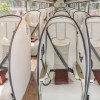 Japan’s ultra-classy overnight bus gives you your own sleeping pod【Photos】
Japan’s ultra-classy overnight bus gives you your own sleeping pod【Photos】 Should you drive through a red traffic light like this in Japan? Confusing road rule explained
Should you drive through a red traffic light like this in Japan? Confusing road rule explained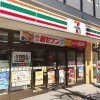 7-Eleven now has make-it-yourself smoothies in Japan, and they’re amazing
7-Eleven now has make-it-yourself smoothies in Japan, and they’re amazing Japan’s most popular maid cafe, Akiba Zettai Ryoiki, opens new “Maid Cafe Winery” in Akihabara
Japan’s most popular maid cafe, Akiba Zettai Ryoiki, opens new “Maid Cafe Winery” in Akihabara Changes to Japan rail pass make it fall out of favour with travellers
Changes to Japan rail pass make it fall out of favour with travellers Old-school titillation: A trip to one of Tokyo’s few surviving “telephone clubs”
Old-school titillation: A trip to one of Tokyo’s few surviving “telephone clubs” Majority of Japanese women in survey regret marrying their husband, but that’s only half the story
Majority of Japanese women in survey regret marrying their husband, but that’s only half the story The 10 most annoying things foreign tourists do on Japanese trains, according to locals
The 10 most annoying things foreign tourists do on Japanese trains, according to locals Starbucks Japan releases new sakura goods and drinkware for cherry blossom season 2026
Starbucks Japan releases new sakura goods and drinkware for cherry blossom season 2026 Naruto and Converse team up for new line of shinobi sneakers[Photos]
Naruto and Converse team up for new line of shinobi sneakers[Photos] Is Sapporio’s Snow Festival awesome enough to be worth visiting even if you hate the snow? [Pics]
Is Sapporio’s Snow Festival awesome enough to be worth visiting even if you hate the snow? [Pics] Japan has trams that say “sorry” while they ride around town…but why?
Japan has trams that say “sorry” while they ride around town…but why? Tokyo Skytree turns pink for the cherry blossom season
Tokyo Skytree turns pink for the cherry blossom season Sakura Totoro is here to get spring started early with adorable pouches and plushies
Sakura Totoro is here to get spring started early with adorable pouches and plushies Poop is in full bloom at the Unko Museums for cherry blossom season
Poop is in full bloom at the Unko Museums for cherry blossom season Shibuya Station’s Hachiko Gate and Yamanote Line stairway locations change next month
Shibuya Station’s Hachiko Gate and Yamanote Line stairway locations change next month Japan’s new “Cunte” contact lenses aren’t pronounced like you’re probably thinking they are
Japan’s new “Cunte” contact lenses aren’t pronounced like you’re probably thinking they are Japan’s newest Shinkansen has no seats…or passengers [Video]
Japan’s newest Shinkansen has no seats…or passengers [Video] Foreigners accounting for over 80 percent of off-course skiers needing rescue in Japan’s Hokkaido
Foreigners accounting for over 80 percent of off-course skiers needing rescue in Japan’s Hokkaido Super-salty pizza sends six kids to the hospital in Japan, linguistics blamed
Super-salty pizza sends six kids to the hospital in Japan, linguistics blamed Starbucks Japan unveils new sakura Frappuccino for cherry blossom season 2026
Starbucks Japan unveils new sakura Frappuccino for cherry blossom season 2026 Take a trip to Japan’s Dododo Land, the most irritating place on Earth
Take a trip to Japan’s Dododo Land, the most irritating place on Earth Is China’s don’t-go-to-Japan warning affecting the lines at a popular Tokyo gyukatsu restaurant?
Is China’s don’t-go-to-Japan warning affecting the lines at a popular Tokyo gyukatsu restaurant? Survey asks foreign tourists what bothered them in Japan, more than half gave same answer
Survey asks foreign tourists what bothered them in Japan, more than half gave same answer Japan’s human washing machines will go on sale to general public, demos to be held in Tokyo
Japan’s human washing machines will go on sale to general public, demos to be held in Tokyo Starbucks Japan releases new drinkware and goods for Valentine’s Day
Starbucks Japan releases new drinkware and goods for Valentine’s Day We deeply regret going into this tunnel on our walk in the mountains of Japan
We deeply regret going into this tunnel on our walk in the mountains of Japan Studio Ghibli releases Kodama forest spirits from Princess Mononoke to light up your home
Studio Ghibli releases Kodama forest spirits from Princess Mononoke to light up your home Major Japanese hotel chain says reservations via overseas booking sites may not be valid
Major Japanese hotel chain says reservations via overseas booking sites may not be valid Put sesame oil in your coffee? Japanese maker says it’s the best way to start your day【Taste test】
Put sesame oil in your coffee? Japanese maker says it’s the best way to start your day【Taste test】 No more using real katana for tourism activities, Japan’s National Police Agency says
No more using real katana for tourism activities, Japan’s National Police Agency says Harajuku looks eerily quiet during the coronavirus outbreak 【Photos】
Harajuku looks eerily quiet during the coronavirus outbreak 【Photos】 Shakey’s Japan releases Mojo Potato recipe to keep home cooks happy during coronavirus outbreak
Shakey’s Japan releases Mojo Potato recipe to keep home cooks happy during coronavirus outbreak Line of foreign tourists leads us to Akihabara’s meatiest fatty ramen【Taste test】
Line of foreign tourists leads us to Akihabara’s meatiest fatty ramen【Taste test】 Kyoto starts new “Empty” tourism campaign to attract tourists during coronavirus outbreak
Kyoto starts new “Empty” tourism campaign to attract tourists during coronavirus outbreak Akihabara ramen restaurant becomes a hit with foreign tourists
Akihabara ramen restaurant becomes a hit with foreign tourists What state of emergency? People in Tokyo defy requests to stay home during coronavirus outbreak
What state of emergency? People in Tokyo defy requests to stay home during coronavirus outbreak Foreign shoppers in Akihabara tip us off to an awesome souvenir idea: DIY Paper Theater kit【Pics】
Foreign shoppers in Akihabara tip us off to an awesome souvenir idea: DIY Paper Theater kit【Pics】 This Akihabara restaurant is the new best place in Tokyo to eat chicken nanban
This Akihabara restaurant is the new best place in Tokyo to eat chicken nanban Akihabara curry restaurant declaring bankruptcy after 50 years in Tokyo’s otaku neighborhood
Akihabara curry restaurant declaring bankruptcy after 50 years in Tokyo’s otaku neighborhood Is the absolute closest conveyor belt sushi to Akihabara Station any good? Let’s find out!
Is the absolute closest conveyor belt sushi to Akihabara Station any good? Let’s find out! Should Akihabara be walled off from the rest of Tokyo? Twitter user proposes bold rezoning plan
Should Akihabara be walled off from the rest of Tokyo? Twitter user proposes bold rezoning plan Akihabara then and now: Photos show how Tokyo neighborhood has changed over the past 10 years
Akihabara then and now: Photos show how Tokyo neighborhood has changed over the past 10 years Ueno Park looks eerily deserted in the midst of the coronavirus 【Photos】
Ueno Park looks eerily deserted in the midst of the coronavirus 【Photos】 Kyoto tourist crowds disappearing due to coronavirus outbreak, creating travel crisis/opportunity
Kyoto tourist crowds disappearing due to coronavirus outbreak, creating travel crisis/opportunity New famous food of Akihabara! Reiwa garlic chive ramen is delicious two times per meal
New famous food of Akihabara! Reiwa garlic chive ramen is delicious two times per meal Akihabara bar’s secret menu beer is a massive treat in the world’s biggest otaku culture center
Akihabara bar’s secret menu beer is a massive treat in the world’s biggest otaku culture center